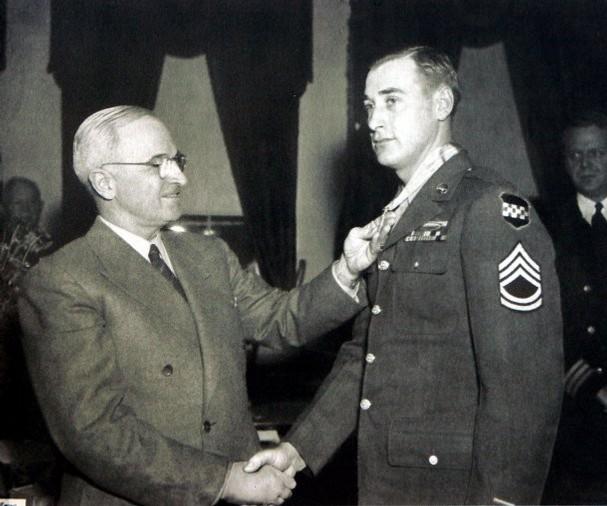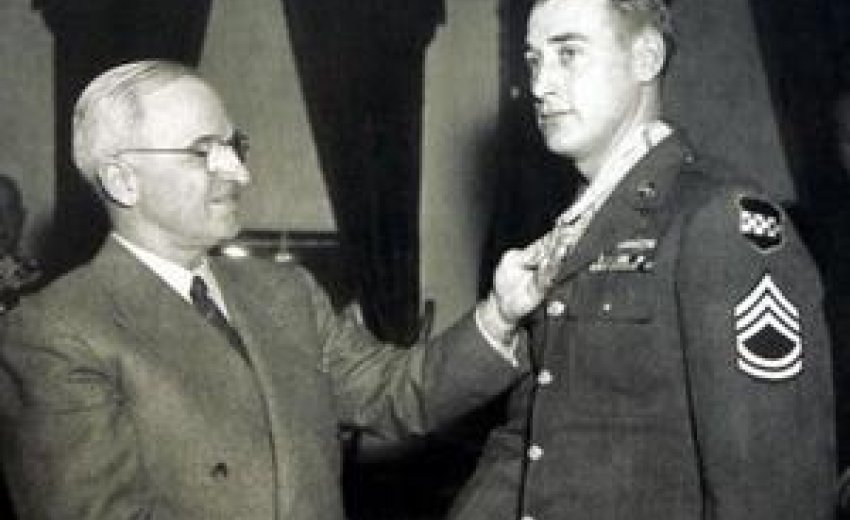 Lazily trolling through the newspaper my eye caught a lengthy obituary. Vernon McGarity died at 91. There was a picture of him with President Truman in 1945 when he was awarded the highest gallantry award of the nation, the Medal of Honor.
Lazily trolling through the newspaper my eye caught a lengthy obituary. Vernon McGarity died at 91. There was a picture of him with President Truman in 1945 when he was awarded the highest gallantry award of the nation, the Medal of Honor.
The 3-column quarter page write-up dwelled on his courage. What caught my attention were the last two lines of the obituary; his grown-up son “Ray McGarity said his father never talked about the war.”
How could that be, I wondered. The war ended 68 years ago. Granted that now he was too old or hesitant to showcase his life on face book or Twitter, but how could a man – a hero -- keep such a searing life-changing experience from his family and friends?
It made me think of the many high ranking top brass I have known who served gallantly in India’s armed forces (army, navy and air force) and won a ton of medals. Without exception I found them chatty about the trivia and the grind or discipline of the armed services – a huge bureaucracy – but they turned stony with sealed lips if asked about specific encounters with the enemy or about particular historic battles in which they had been singularly honored. They would talk in general terms of the battle – the larger plans, a particularly winning tactic or even the bravery of their men as a group, but never would one talk of the horrendous side of a battle or glorify one’s own personal role in it.
And I wondered why? Surely, generals are not known for their modesty; instead they are strutting peacocks. Why would such grown men, obviously accomplished and universally idolized and admired, fall so silent? They couldn’t be so bashful, could they?
And then I thought a bit about the events of 1984. For the forgetful a thumbnail summary would be that in June 1984 the Indian government deployed an overwhelming force of its elite troops to attack the Golden Temple (a Sikh place of worship) in Amritsar and 40 additional gurduaras across Punjab; and who then over the next few days let loose a virtual storm of terror – arresting and killing uncounted number of Sikhs. All those killed and injured have never been accounted for until today.
The icing on the cake came four months later. An orchestrated pogrom of terror against Sikhs reigned in the capital city of Delhi and several towns across India for a good two days and nights. Truckloads of looters and armed killers descended on Sikh localities and businesses and systemically killed, maimed, raped or burned to death thousands while the police stood by and encouraged the mayhem. Remember these were pre-Google days when it was not easy to collect names and addresses of Sikhs and their businesses but the killers carried such lists.
Over 10 official Inquiry Commissions have done their work under pressure but were unable to identify more than a handful of low level guilty people, even though the government admits to the killing of over 2,700 Sikh men, women and children in Delhi alone. Many credible witnesses, of course, put the numbers much higher. To me it was an “organized crime” and should be treated as such.
Many books and reports have been written that lambasted the Indian government. But what fascinates me more is something else.
There exist very few firsthand accounts of the atrocities – the maiming, looting and raping -- by the surviving victims, and there should be an incredible number of such stories by those who personally suffered or saw the events firsthand.
What then is the common element in the stories of wars that we human wage? What happens in wars that drive strong men and women to silence?
The victims and perpetrators remain largely silent perhaps for the same reason that McGarity and other war heroes do.
Humans are capable of intense loyalty and kindness to the point that they would willingly die for what they are convinced is a deserving cause; they will die for a friend as also for a stranger. But there is another side to the coin: humans are also capable of intense cruelty in a cause. War stories are replete with stories of unimagined heroism and nobility but they are also just as full of depravity, cruelty, trickery and killings. Our murderous urges are just as common as our noble ones; they rise to the surface and define us just as often as our generous spirits.
For every victim there is a perpetrator. A victim’s account may be somewhat graphic but the perpetrator’s is never more than brief and sanitized. In the heat of battle angry urges are common; they just need to be directed and controlled. But when the warrior returns from the battle, revisiting them they would be embarrassing. Wars are ugly. Rape, torture, pillaging and looting are not unknown, even when they are not talked about. For a hint just ponder the open scandal around sexual harassment of women soldiers in the American armed forces today.
We don’t wish to give our suffering a second life. We may have won the battle but what we had to do to win is not what we wish to relive or boast about. It is perhaps easier to continue on with life if the horrors of war are buried deep, never to be exhumed. Perhaps we don’t want the things we do in the heat of our existential struggle to define us.
Does silence merely make life possible or does it give us nobility?
[email protected]
June 12, 2013





